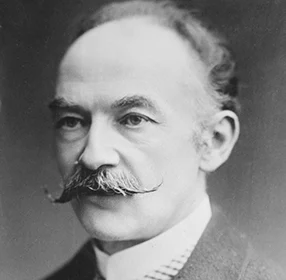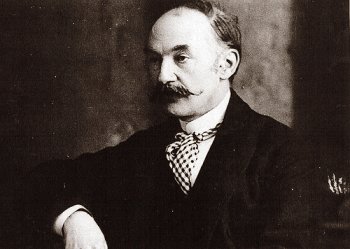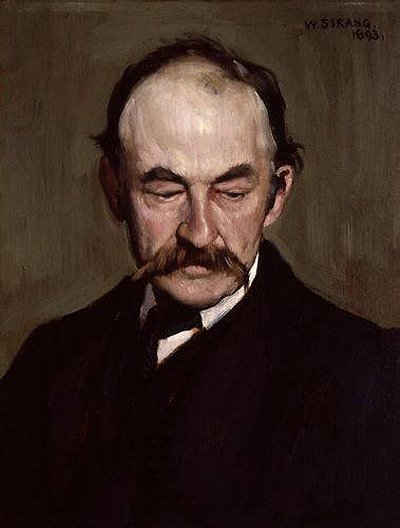Fleurs du Mal Magazine


Or see the index

Snow in the Suburbs
Every branch big with it,
Bent every twig with it;
Every fork like a white web-foot;
Every street and pavement mute:
Some flakes have lost their way, and grope back upward when
Meeting those meandering down they turn and descend again.
The palings are glued together like a wall,
And there is no waft of wind with the fleecy fall.
A sparrow enters the tree,
Whereon immediately
A snow-lump thrice his own slight size
Descends on him and showers his head and eye
And overturns him,
And near inurns him,
And lights on a nether twig, when its brush
Starts off a volley of other lodging lumps with a rush.
The steps are a blanched slope,
Up which, with feeble hope,
A black cat comes, wide-eyed and thin;
And we take him in.
Thomas Hardy
(1840 – 1928)
Snow in the Suburbs
• fleursdumal.nl magazine
More in: # Classic Poetry Archive, 4SEASONS#Winter, Archive G-H, Archive G-H, Hardy, Thomas
Thomas Hardy
(1840-1928)
Ah, Are You Digging on My Grave?
“Ah, are you digging on my grave
My loved one? — planting rue?”
— “No, yesterday he went to wed
One of the brightest wealth has bred.
‘It cannot hurt her now,’ he said,
‘That I should not be true.'”
“Then who is digging on my grave?
My nearest dearest kin?”
— “Ah, no; they sit and think, ‘What use!
What good will planting flowers produce?
No tendance of her mound can loose
Her spirit from Death’s gin.’ “
“But some one digs upon my grave?
My enemy? — prodding sly?”
— “Nay: when she heard you had passed the Gate
That shuts on all flesh soon or late,
She thought you no more worth her hate,
And cares not where you lie.”
“Then, who is digging on my grave?
Say — since I have not guessed!”
— “O it is I, my mistress dear,
Your little dog, who still lives near,
And much I hope my movements here
Have not disturbed your rest?”
“Ah yes! You dig upon my grave . . .
Why flashed it not on me
That one true heart was left behind!
What feeling do we ever find
To equal among human kind
A dog’s fidelity!”
“Mistress, I dug upon your grave
To bury a bone, in case
I should be hungry near this spot
When passing on my daily trot.
I am sorry, but I quite forgot
It was your resting-place.”
Thomas Hardy poetry
fleursdumal.nl magazine
More in: Archive G-H, Hardy, Thomas

Thomas Hardy
“Ah, Are You Digging on My Grave?”
“Ah, are you digging on my grave
My loved one? — planting rue?”
– “No, yesterday he went to wed
One of the brightest wealth has bred.
‘It cannot hurt her now,’ he said,
‘That I should not be true.’”
“Then who is digging on my grave?
My nearest dearest kin?”
– “Ah, no; they sit and think, ‘What use!
What good will planting flowers produce?
No tendance of her mound can loose
Her spirit from Death’s gin.’ “
“But some one digs upon my grave?
My enemy?—prodding sly?”
– “Nay: when she heard you had passed the Gate
That shuts on all flesh soon or late,
She thought you no more worth her hate,
And cares not where you lie.”
“Then, who is digging on my grave?
Say—since I have not guessed!”
– “O it is I, my mistress dear,
Your little dog, who still lives near,
And much I hope my movements here
Have not disturbed your rest?”
“Ah yes! You dig upon my grave . . .
Why flashed it not on me
That one true heart was left behind!
What feeling do we ever find
To equal among human kind
A dog’s fidelity!”
“Mistress, I dug upon your grave
To bury a bone, in case
I should be hungry near this spot
When passing on my daily trot.
I am sorry, but I quite forgot
It was your resting-place.”
“O joh, graaf jij hier aan mijn graf”
“O joh, graaf jij hier aan mijn graf
Voor tijm-aanplant, mijn schat?”
– “Nee, gisteren is hij gehuwd
Met ‘n ster door weelde opgestuwd.
‘Haar pijn,’ zei hij, ‘is nu geluwd,
Al had ik schuld gehad.’ “
“Maar wie graaft hier dan aan mijn graf?
Mijn liefste broer of zus?”
– “O nee, zij denken maar, ‘Welk nut
Wordt hier uit bloemenkweek geput?
Geen Dood wordt van haar geest geschud
Door terp- of grondwerkklus.’ “
“Maar iemand graaft toch aan mijn graf?
Die feeks?—die roddel jouwt?”
– “Nee: want, nu zij jouw vlees voor goed
De poort door weet, die elk door moet,
Vindt zij dat haat er niet toe doet,
En laat jouw terp haar koud.”
“Maar wie graaft hier dan aan mijn graf?
Vertel—daar ik ‘t niet raad!”
– “O, ik ben het, mijn vrouwtje lief,
Je hond, die menig pootje hief
Hier;—hopelijk doet ongerief
Daaruit jouw rust geen kwaad!”
“O ja! Jij graaft hier aan mijn graf—
Waarom bleek me al niet gauw
Dat één trouw hart hier steeds nog was?
En welk gevoel in ‘t menselijk ras
Houdt ooit ook maar gelijke pas
Met zulke hondentrouw!”
” ‘k Begroef hier, vrouwtje, op je graf
Een kluif, voor op de dag
Dat ik geen voer te vinden weet
Als ik hier in mijn rondje treed.
Spijt heb ik, maar vergat compleet
Dat hier jouw rustplaats lag.”
Thomas Hardy: “Ah, Are You Digging on My Grave?”
in een nieuwe vertaling van: Cornelis W. Schoneveld (jan. 2013)
kempis.nl poetry magazine
More in: Archive G-H, Hardy, Thomas, More translations

Thomas Hardy
(1840-1928)
Ah, Are You Digging on My Grave?
“Ah, are you digging on my grave
My loved one? — planting rue?”
— “No, yesterday he went to wed
One of the brightest wealth has bred.
‘It cannot hurt her now,’ he said,
‘That I should not be true.'”
“Then who is digging on my grave?
My nearest dearest kin?”
— “Ah, no; they sit and think, ‘What use!
What good will planting flowers produce?
No tendance of her mound can loose
Her spirit from Death’s gin.’ “
“But some one digs upon my grave?
My enemy? — prodding sly?”
— “Nay: when she heard you had passed the Gate
That shuts on all flesh soon or late,
She thought you no more worth her hate,
And cares not where you lie.”
“Then, who is digging on my grave?
Say — since I have not guessed!”
— “O it is I, my mistress dear,
Your little dog, who still lives near,
And much I hope my movements here
Have not disturbed your rest?”
“Ah yes! You dig upon my grave . . .
Why flashed it not on me
That one true heart was left behind!
What feeling do we ever find
To equal among human kind
A dog’s fidelity!”
“Mistress, I dug upon your grave
To bury a bone, in case
I should be hungry near this spot
When passing on my daily trot.
I am sorry, but I quite forgot
It was your resting-place.”
Thomas Hardy poetry
kempis.nl poetry magazine
More in: Archive G-H, Hardy, Thomas

Thomas Hardy
(1840-1928)
Neutral Tones
We stood by a pond that winter day,
And the sun was white, as though chidden of God,
And a few leaves lay on the starving sod;
– They had fallen from an ash, and were gray;
Your eyes on me were as eyes that rove
Over tedious riddles of years ago;
And some words played between us to and fro
On which lost the more by our love.
The smile on your mouth was the deadest thing
Alive enough to have strength to die;
And a grin of bitterness swept thereby
Like an ominous bird a-wing…
Since then, keen lessons that love deceives,
And wrings with wrong, have shaped to me
Your face, and the God-curst sun, and a tree,
And a pond edged with grayish leaves.
1867
Thomas Hardy
Neutrale tinten
We stonden bij ‘n plas in winterse kou,
En de zon, zo wit, leek verstoten door God,
En wat blad lag op ‘t gras, halfverrot;
– Het kwam van een es, en was grauw;
Jouw blik op mij was als ‘n blik die dwaalt
Over saaie raadsels al jaren voorbij;
En wat taal speelde er tussen jou en mij
Over wíens liefde ‘t meest had gefaald.
De lach om je mond was het doodste ding
Nog levend genoeg voor ‘n gang naar ‘t graf;
En een bittere grijns schoot er vanaf,
Alsof ‘n vogel in doemvlucht ging…
Sindsdien, biedt ‘t feit dat liefde misleidt,
Verstrikt met kwaad, mij de bittere les
Van je blik, en ‘n Godloze zon, en ‘n es
En ‘n plas, en wat grijs blad verspreid.
Vertaling Cornelis W. Schoneveld
Uit: Bestorm mijn hart, de beste Engelse gedichten uit de 16e-19e eeuw gekozen en vertaald door Cornelis W. Schoneveld, tweetalige editie. Rainbow Essentials no. 55, Uitgeverij Maarten Muntinga, Amsterdam, 2008, 296 pp, € 9,95 ISBN: 9789041740588
kempis.nl poetry magazine
More in: Archive G-H, Hardy, Thomas, More translations
Thank you for reading Fleurs du Mal - magazine for art & literature